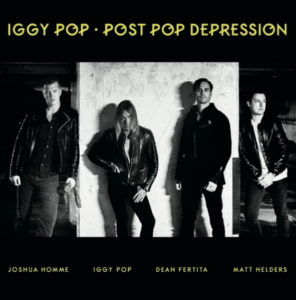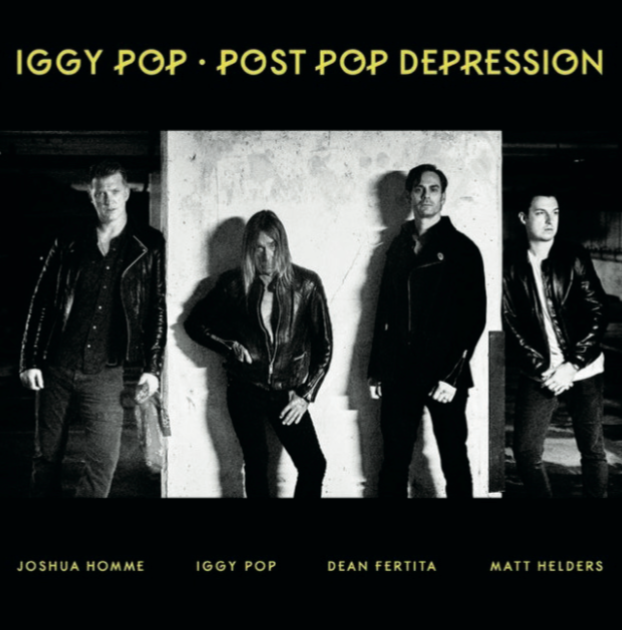By Joel Robertson-Taylor (Contributor) – Email

If you’re an Iggy Pop fan, dating back to his work from when Star Wars and Saturday Night Fever were on the big screen, or even since Nixon stepped down from the presidency, you might have mixed feelings about his newest album, Post Pop Depression. It’s still Iggy Pop, but with a fresh flavour. Despite the new lineup, it’s a bit reminiscent of some of his work with The Stooges, and definitely a lot more comparable to his collaborations with the late David Bowie; it’s slinky and seductive and has sugar in all the right places. It’s an album that demands you get comfortable, do whatever you do, and listen to the whole album through.
As Post Pop is possibly his final album (Pop disclosed this in an interview for Apple Music), he’s chosen an all-star cast to collaborate with. With a band consisting of Dean Fertita (Queens of the Stone Age, Dead Weather), Matt Helders (Arctic Monkeys), and of course Josh Homme (Queens of the Stone Age, Eagles of Death Metal, Them Crooked Vultures), there was no question about the direction the record was going to take.
As a long time fan of both Homme and Pop, I think this album is delicious, and it actually makes a lot of sense to see the two working together. No one may have predicted Homme, Fertita, and Helders (who have all worked together, separately, all over the place) getting together with the proto-punk king, Iggy Pop, but it’s sure a lethal combination. Considering that Homme has previously featured Sir Elton John on one of his songs (“Fairweather Friends”) and formed a band with John Paul Jones, it’s not totally surprising that he got together with another rock giant and started jamming.
Dark and groovy, the album flaunts a few guitar solos, a “grand punky piano,” and a whole lot of Iggy Pop. He brings the same kind of sass from his earlier albums, but as an experienced old man now. Leave it to Iggy to show some old man sass, which I’m certain we’ll get a lot of in his live shows.
In typical Iggy style, the lyrics are dashing, profane and on “Gardenia” they’re flirtatious in a uniquely hotel room romance kind of way. But he goes beyond this to reveal an introspective Iggy. I think this is one of Post Pop Depression’s biggest charms; although not boasting the most lyrically impressive songs ever, they feel honest. “I’m tired of it / And I dream about getting away / To a new life / Where there’s not so much fucking knowledge,” Iggy croons on “Paraguay.” “I’m not the man with everything / I’ve nothing but my name,” he confesses on “American Valhalla,” reflecting on his career.
Even the album title Post Pop Depression is incredibly suggestive in this regard.
“German Days” is a crunchy blues composition, and it’s one of the few strong hints of eau de Queens of the Stone Age. You can tell because the guitar screams and the lyrics don’t totally make sense. This is the song that, according to the album credits, features the “grand punky piano” — whatever that is.
The album’s heavy hitter is “Sunday,” which is also the funkiest of the mix. Very hooky and full of fun, it plays against Helders’ spry drum chops and features a go-go girl backing vocal track, obviously.
Perhaps not an album that most artists would want to call their final entry, Post Pop Depression resembles more closely a denouement as opposed to a grand finale. From an artist known for live self-mutilation and other theatrical acts of a disturbing nature, this album could be compared to a form of studio self-mutilation — for theatrics, of course. And Iggy has always been a legend of live performance anyway, his vivacious charisma and mastery of his own battlefield — the stage — have kept his career alive for over 40 years. It’s as if after emerging from the Styx it was declared that the stage would be his fate and his finish.
“I’m a wreck / What’d you expect?” bellows Iggy on “Sunday.” Though the album as a whole often lacks movement and feels a bit dry at times, “Sunday” partially remedies this, progressing into an oddly triumphant orchestral finale, before segueing into “Vulture,” a very spaghetti-western-desert-like theme.
There’s something sly and almost cabaret about the whole album. Iggy sings, “When you get to the bottom, you’re near the top / Where shit turns into chocolate drops,” sounding a bit embittered and sarcastic about his career.
The album isn’t all it could be — but it’s exactly what it should be as an Iggy Pop album produced by Josh Homme. And that’s bloody fantastic.


